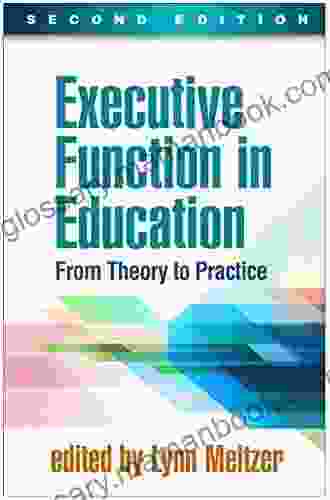Unveiling the Enigma of Executive Function in Education: A Second Edition to Unlock Cognitive Potential

Executive function (EF),the orchestrator of our cognitive processes, occupies a central stage in the realm of education. Its multifaceted nature encompasses a symphony of skills, including working memory, inhibition, cognitive flexibility, and metacognition, which form the very cornerstone of academic success.
This second edition of our Executive Function in Education article delves deeper into the intricate tapestry of EF, exploring its profound impact on learning, the challenges students encounter, and the groundbreaking interventions that can cultivate their cognitive prowess. By unlocking the secrets of EF, we empower educators and parents with the tools to nurture students' minds and unlock their full potential.
4.9 out of 5
| Language | : | English |
| File size | : | 3794 KB |
| Text-to-Speech | : | Enabled |
| Screen Reader | : | Supported |
| Enhanced typesetting | : | Enabled |
| Word Wise | : | Enabled |
| Print length | : | 18 pages |
The Role of Executive Function in Learning
EF serves as the maestro of our cognitive orchestra, seamlessly coordinating and directing the various mental processes that underpin academic achievement.
1. Working Memory: The Cognitive Stage
Working memory, akin to a mental workspace, temporarily holds and manipulates information, laying the foundation for complex cognitive tasks. It allows students to remember instructions, solve multi-step problems, and engage in critical thinking.
2. Inhibition: The Self-Control Gatekeeper
Inhibition acts as a self-control gatekeeper, suppressing impulsive responses and allowing students to focus on relevant information. By resisting distractions and controlling impulses, students can maintain attention, manage their emotions, and make well-informed decisions.
3. Cognitive Flexibility: The Mental Acrobat
Cognitive flexibility empowers students with the agility to adapt their thinking and shift perspectives. This mental acrobatics enables them to solve problems from different angles, consider alternative solutions, and respond effectively to changing demands.
4. Metacognition: The Self-Reflective Compass
Metacognition, the pinnacle of EF, involves the ability to monitor and regulate one's own learning. It allows students to plan, evaluate, and adjust their strategies, fostering a deep understanding of their strengths and weaknesses.
Challenges in Executive Function Development
While EF is a crucial component of learning, its development can be fraught with challenges that hinder students' academic progress.
1. Attention Disorders
Attention disorders, such as ADHD, can significantly impair working memory, inhibition, and cognitive flexibility, making it difficult for students to focus, control impulses, and adapt to changing demands.
2. Learning Disabilities
Learning disabilities, such as dyslexia and dyscalculia, can affect the development of specific EF skills, impacting reading comprehension, math problem-solving, and working memory.
3. Socioeconomic Disparities
Socioeconomic disparities can contribute to EF deficits, as children from disadvantaged backgrounds may experience limited access to resources, nutrition, and early childhood education that support EF development.
Intervention Strategies to Enhance Executive Function
To address the challenges students face, a range of innovative interventions can be implemented to enhance EF and foster cognitive growth.
1. Cognitive Training Programs
Cognitive training programs, such as Cogmed and Lumosity, provide targeted exercises to improve working memory, inhibition, and cognitive flexibility. These programs have been shown to enhance academic performance and reduce symptoms of attention disorders.
2. Mindfulness and Meditation Practices
Mindfulness and meditation practices cultivate self-awareness, emotional regulation, and attention control. By training students to focus on the present moment and regulate their emotions, these practices can improve EF skills and reduce stress.
3. Classroom Accommodations and Modifications
Classroom accommodations and modifications can create a supportive learning environment for students with EF challenges. These interventions may include preferential seating, extended time for assignments, and visual aids to support working memory.
4. Parent and Teacher Collaboration
Collaboration between parents and teachers is crucial in supporting students' EF development. By sharing observations, implementing consistent strategies, and providing home support, parents and teachers can create a cohesive and supportive environment that fosters EF growth.
Assessment of Executive Function
Accurately assessing EF is essential for identifying students who may benefit from targeted interventions. A range of assessment tools is available, including:
1. Standardized Tests
Standardized tests, such as the BRIEF2 and TOVA, provide comprehensive assessments of EF skills, including working memory, inhibition, and cognitive flexibility.
2. Observational Assessments
Observational assessments, such as the Barkley Deficits in Attention, Motor Control, and Perception (DAMP) Scale, allow teachers and clinicians to observe and rate students' EF behaviors in real-world settings.
3. Neuroimaging Techniques
Neuroimaging techniques, such as fMRI and EEG, provide insights into the neural mechanisms underlying EF. These techniques can help researchers understand the brain regions involved in EF and explore the impact of interventions.
Executive function, the mastermind behind our cognitive processes, plays an indispensable role in educational achievement. By comprehending the intricate tapestry of EF skills and the challenges that students face, we can implement innovative interventions that unlock their cognitive potential. Through targeted assessment, collaboration, and evidence-based practices, we empower educators and parents to cultivate students' minds and nurture their academic success.
Our second edition of Executive Function in Education is a testament to our unwavering commitment to unraveling the complexities of EF and providing educators and parents with the tools to empower students. As we continue to delve into this fascinating field, we look forward to uncovering new insights and developing cutting-edge strategies that will revolutionize the way we support students' cognitive growth.
4.9 out of 5
| Language | : | English |
| File size | : | 3794 KB |
| Text-to-Speech | : | Enabled |
| Screen Reader | : | Supported |
| Enhanced typesetting | : | Enabled |
| Word Wise | : | Enabled |
| Print length | : | 18 pages |
Do you want to contribute by writing guest posts on this blog?
Please contact us and send us a resume of previous articles that you have written.
 Top Book
Top Book Novel
Novel Fiction
Fiction Nonfiction
Nonfiction Literature
Literature Paperback
Paperback Hardcover
Hardcover E-book
E-book Audiobook
Audiobook Bestseller
Bestseller Classic
Classic Mystery
Mystery Thriller
Thriller Romance
Romance Fantasy
Fantasy Science Fiction
Science Fiction Biography
Biography Memoir
Memoir Autobiography
Autobiography Poetry
Poetry Drama
Drama Historical Fiction
Historical Fiction Self-help
Self-help Young Adult
Young Adult Childrens Books
Childrens Books Graphic Novel
Graphic Novel Anthology
Anthology Series
Series Encyclopedia
Encyclopedia Reference
Reference Guidebook
Guidebook Textbook
Textbook Workbook
Workbook Journal
Journal Diary
Diary Manuscript
Manuscript Folio
Folio Pulp Fiction
Pulp Fiction Short Stories
Short Stories Fairy Tales
Fairy Tales Fables
Fables Mythology
Mythology Philosophy
Philosophy Religion
Religion Spirituality
Spirituality Essays
Essays Critique
Critique Commentary
Commentary Glossary
Glossary Bibliography
Bibliography Index
Index Table of Contents
Table of Contents Preface
Preface Introduction
Introduction Foreword
Foreword Afterword
Afterword Appendices
Appendices Annotations
Annotations Footnotes
Footnotes Epilogue
Epilogue Prologue
Prologue Judson Brewer
Judson Brewer Ken Youens Clark
Ken Youens Clark Francisco De Quevedo
Francisco De Quevedo Rae A Stonehouse
Rae A Stonehouse Kelsey Browning
Kelsey Browning Peter Fifield
Peter Fifield Jason Mclean
Jason Mclean Abigail R Gehring
Abigail R Gehring Edna Lewis
Edna Lewis Golden Lion Publications
Golden Lion Publications Margaret Lashley
Margaret Lashley Sugata Mitra
Sugata Mitra Rich Fettke
Rich Fettke Candice James
Candice James William Faulkner
William Faulkner Sarita Leone
Sarita Leone Jaclyn Weist
Jaclyn Weist Herman Lehmann
Herman Lehmann Therese Quinn
Therese Quinn Guy Claxton
Guy Claxton
Light bulbAdvertise smarter! Our strategic ad space ensures maximum exposure. Reserve your spot today!
 Jaime MitchellFollow ·13.6k
Jaime MitchellFollow ·13.6k Kurt VonnegutFollow ·15.8k
Kurt VonnegutFollow ·15.8k Dan HendersonFollow ·3.2k
Dan HendersonFollow ·3.2k Oliver FosterFollow ·2.6k
Oliver FosterFollow ·2.6k Henry GreenFollow ·12.7k
Henry GreenFollow ·12.7k Demetrius CarterFollow ·8k
Demetrius CarterFollow ·8k Randy HayesFollow ·14.7k
Randy HayesFollow ·14.7k Troy SimmonsFollow ·13.4k
Troy SimmonsFollow ·13.4k

 Cody Blair
Cody BlairWill You Ever Pee Alone Again? The Future of Bathroom...
The bathroom has long been a place of...

 Al Foster
Al FosterNine Years Among the Indians 1870-1879: Witnessing Their...
In the annals of American...

 Pete Blair
Pete BlairYekl and the Imported Bridegroom: A Window into the New...
Abraham Cahan's Yekl and the...

 Pablo Neruda
Pablo NerudaSearch Engine Optimization Guide: A Non-Technical...
In today's digital landscape, having a...

 Nikolai Gogol
Nikolai GogolOne Piece Vol 77: Smile - The Saga Continues with...
The Enthralling World...

 Dan Henderson
Dan HendersonThree Farmers On Their Way To Dance
In a quaint countryside...
4.9 out of 5
| Language | : | English |
| File size | : | 3794 KB |
| Text-to-Speech | : | Enabled |
| Screen Reader | : | Supported |
| Enhanced typesetting | : | Enabled |
| Word Wise | : | Enabled |
| Print length | : | 18 pages |












